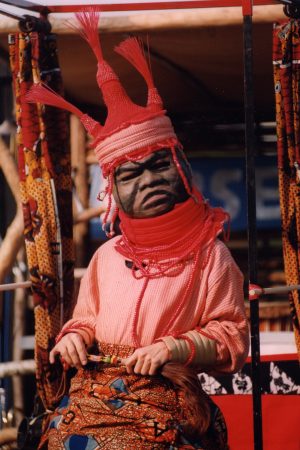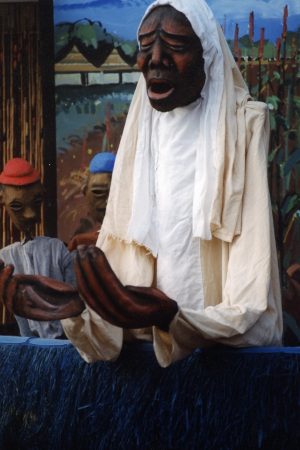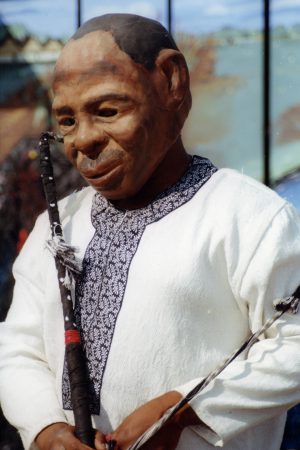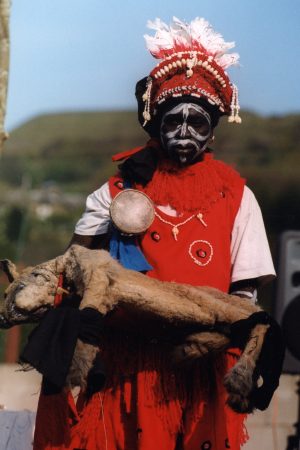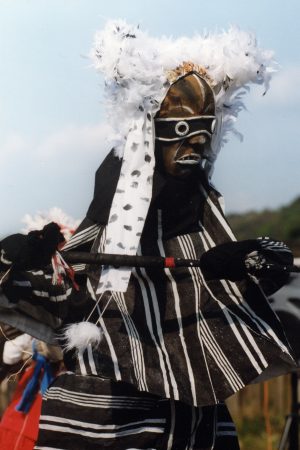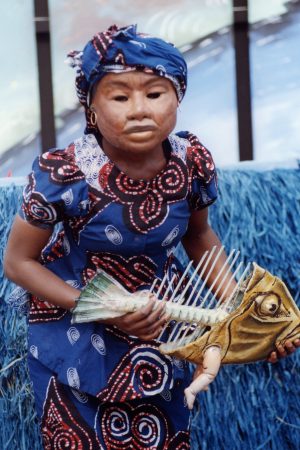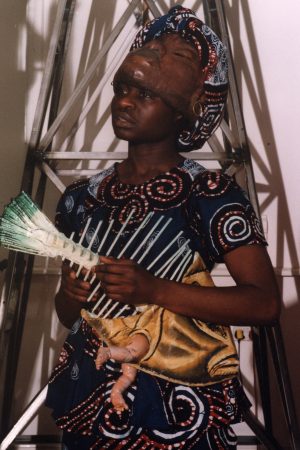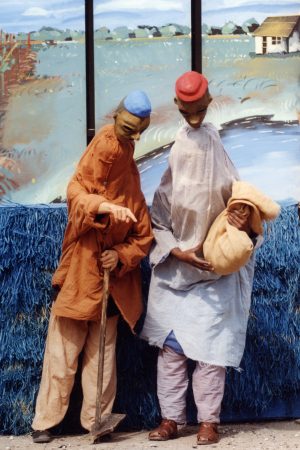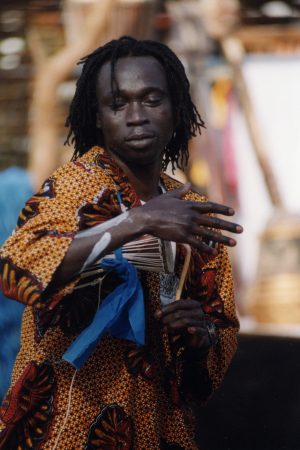Professor Martin Banham, from the department of African Theatre Studies at the University of Leeds, telephoned to ask if he might bring over a visiting Commonwealth Fellow, Professor Sam Ukala, from Nigeria. Professor Ukala was researching English Folk Theatre and couldn’t find any. Could we help?
Folkism
Sam Ukala visited while we were moving into our new building, and was excited by what he saw of ‘Creaking Floorboard’ . Sam is an academic as well as a playwright, and was then Professor of Drama and Theatre Arts at Edo State University. His area of special interest was what he termed ‘folkism’; the study of native African forms of theatre, in contrast to the drama tradition that had been introduced to West Africa by the British colonial power. Native forms were at the heart of his own theatre writing. I read his work and found it unlike anything I had come across before, but powerful and persuasive. When I suggested that Leeds University might help him return to work with me on a new production he jumped at the opportunity. We kept in touch for over a year in order to organise the paperwork and funds to support his time in Britain. Communications with Nigeria were difficult and every letter sent took months before getting a reply.
Sam Ukala
Professor Ukala joined us in late 1998 and it was only then that we really began to consider just how we might work together on a production. We also needed to agree on what the subject would be. There was a period of shock in which Sam digested that our work was essentially non-verbal. He was an acclaimed playwright and words were his ‘dominant tools’. We needed time to think about this potentially huge problem. I was on tour shortly afterwards in the Netherlands, and there I heard about the protests by Ijo campaigners about the devastation of the Nigerian Delta by oil companies, especially Shell. I mentioned this to Sam, and he felt it would make a good starting point for us to work with. Sam had known the writer Ken Saro-Wiwa, who had been executed in 1995, along with eight others, for their involvement in this very protest. I felt Sam should write a dramatic treatment for us to use as a point of departure. The story of this process was recorded by Sam Ukala and published in African Theatre: Playwrights & Politics 2001.
Casting
Sam locked himself away (he was staying with Kay and myself) and he wrote a scenario in five days. I felt that it was absolutely right for us, and I quickly started the process of turning it into a visual script. This meant making a few small alterations to Sam’s basic storyline but, in essence, very few changes had to be made. I simply created visual settings for his storyline. I also started work on designing a set, performing structures, masks, puppets, and the props. After that, working closely with Sam, we created a choreography that would tell the story as if it were a dance piece. In general, though, our approaches were quite different, since Sam’s directing had mainly been with undergraduate students and text-based plays, mine had been with professional actors experienced in visual and movement-based theatre. Sam therefore tended to be more prescriptive; I tended to allow room for experimentation and for input from the wider company.
We were far more successful in casting black performers than in 1994 with Dance of White Darkness. It was essential to work with a mixed race cast for Harvest of Ghosts and we chose Dan Poyser, ‘Funmi Adewole, and Yusupha Mboob for the African parts. Dan was a young actor from Manchester, ‘Funmi a dancer from London, and Yusupha a Gambian master-drummer. Horse + Bamboo regulars Nicky Fearn, Victoria Lee, Kathy Bradley and horse-handler Glen Wilson played the other roles. All members of the cast played music, along with MD Loz Kaye, so we also had a great procession band. The show was written and designed to be performed outdoors, and it toured very successfully in the UK, Ireland and the Netherlands.
Living ‘ghosts’
Sam wrote
“Like the African folk festival and story-telling theatres, whose aesthetics we drew on, Harvest of Ghosts deals with the past, present and future, the living and the dead. At the beginning of the play, Ancestors represent the dead, but at the end the living ‘ghosts’ of those killed for protesting injustice and inhumanity, living ‘ghosts’ such as the Ijo and Ogoni youths are still fighting long after Ken Saro-Wiwa and hundreds more have been killed. The play suggests that the enemies of the people will be subdued by the combined efforts of the living and the dead. ‘The Ogoni Troubles’ may not end until the ‘ghosts’ overwhelm their harvesters and entrap them in their own destructive technology.
“The play is clearly moralistic and has the simple structure of a folk narrative as well as the intriguing compositeness and symbolism of the African festival. It focuses serious political issues by delicately combining entertainment with public enlightenment in a language that cuts across educational backgrounds and national boundaries.
“In 1999, Harvest of Ghosts played to enthralled audiences who gave it robust praise. The Manchester Evening News of May 22 described it as a ‘wordless wonder’…”
“Their highly evolved performances, being without dialogue but with constant live music and much use of masks, naturally gives themselves to universalism but the company is very ready to allow itself to be inspired by specific cultures far from its Rossendale base…
“It (Harvest of Ghosts) has taken various images of undisputed truth and, although they are closely related to particular historical events, and draw much of their power from this fact, have been wound into a picture of much more general import. Those…who saw these striking images and their lively performance to the accompaniment of the ever-involving music will have seen a powerful vision of how ruthless industrial development can destroy both natural and social health. The involvement of the audience was clear even when they were silent, made the clearer by sudden cries, such as “No! No!” when Kika handed the merchant back his gun, and by the rapturous applause at the end. The vivid masks helped to bind together the historical conflation…(and) though of African features, are of the style used by Horse + Bamboo in other works in other polities but they naturally fit into a culture where masks have played a leading part in the dramatic expression of religious and social belief, seen here in their own style on the ancestral spirits and around the shrine. Many divers talents and insights have gone into this work and they have been united in a great achievement.”
Iredi War
On his return to Nigeria, Professor Ukala revived Harvest of Ghosts as part of his new post at Delta State University, where he was Chairman of the Delta State Chapter of the Association of Nigerian Authors (ANA). His “Iredi War”, a ‘folk-script’, won the 2014 Nigeria Prize for Literature, Africa’s largest literary prize. It is based on the 1906 uprising of the Owa Kingdom (now part of Delta State) against oppressive British rule. As in previous pieces, he utilises and brings new life to oral literature and folk-based theatre forms.
Sam Ukala died after a short illness in September, 2021. He was described as a ‘great literary icon’. Throughout his life he gathered many awards and honours for his writing. It was great privilege to have worked so closely with him on this show.



